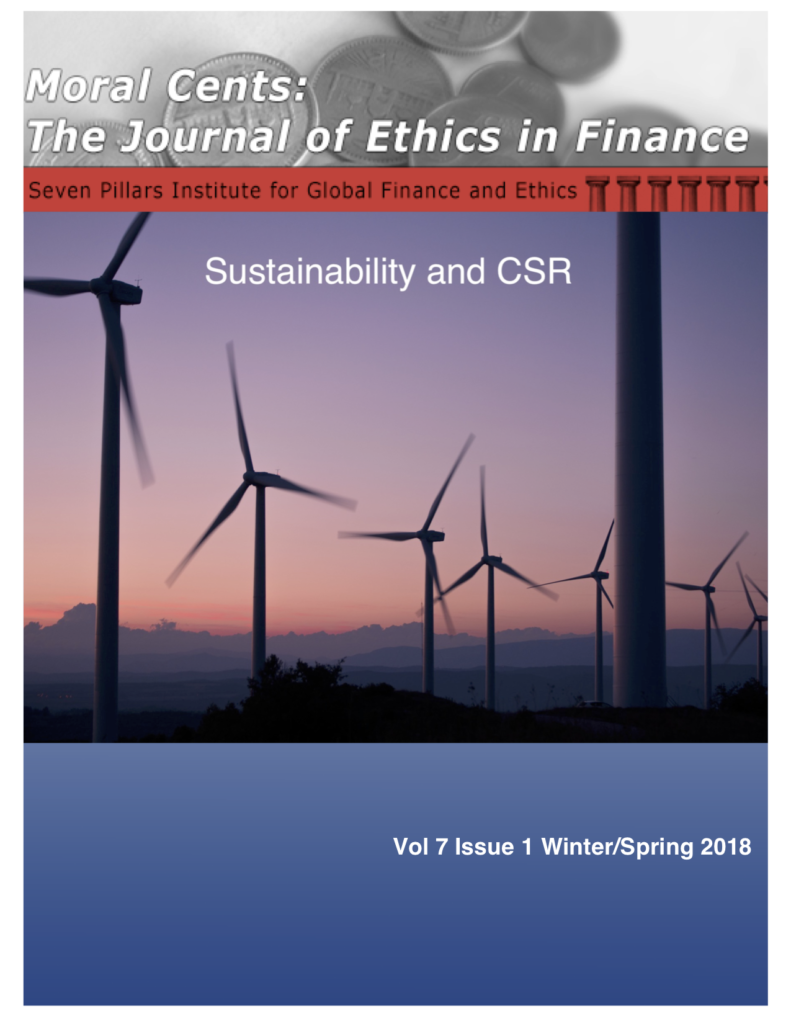Latest Issue of Moral Cents on Sustainability
A few weeks ago, I joined a conference call featuring financier Larry Fink as the speaker. Mr. Fink is the Chairman and CEO of BlackRock, the largest money-management firm in the world with more than $6 trillion in assets under management. He spoke of BlackRock’s approach to sustainable, socially responsible investing and the growing popularity of ESG funds. A question arose as to what ESG stood for, which gave Mr. Fink some pause because the full name, Environmental, Social and Governance, does not leap immediately and intuitively into the mind. Clearly, the term covers a wide range of factors but growing evidence suggests including ESG analysis into investment decisions, may actually improve long-term performance. Al Gore believes that “sustainability history’s biggest investment opportunity“. ESG investing is a happening field.
There is therefore, a need for further study of this investment methodology that goes by many names: ESG, Impact Investing, Sustainable Investing, Socially Responsible Investing (SRI), Corporate Social Responsibility (CSR). This issue of Moral Centsattempts to give further insights into ESG, CSR, and Sustainability as applied to finance.
Anne Anderson and David Myers present some clarity on this spectrum of non-traditional investing. They do this by addressing the issue of the motivation of economic agents when engaging in sustainable investing. Anderson and Myers posit two new dimensions beyond wealth maximization from which decisions are made: social distance and efficiency. Social distance is how we value social issues and others. Efficiency measures the lowering of transaction costs between individuals and groups. Their innovative new model of thinking about sustainable investing is a valuable addition to the conversation.
Gopal Kumar focuses on two dark areas of human activity in which CSR funds and corporations should be on the alert to avoid. In his first article, he gives some guidance on how corporations and financial institutions can extricate themselves from supply chains that incorporate forced labor and involve human trafficking. His second article examines the mineral trade in the Democratic Republic of the Congo (DRC) with a focus on the effect of Section 1502 of the Dodd-Frank Act on this trade. Again, how do firms avoid supply chains that include conflict minerals from the DRC?
A discussion of sustainable investing is not complete without mention of the risks of climate change. Should investment funds consider investing in corporations that ignore this risk? Thomas Rochford argues that climate change is a new class of non-financial risk. Directors who choose to ignore or not disclose the effects of climate change on their firms court a failure of ethics.
Finally, Seven Pillars Institute continues its exploration of Universal Basic Income (UBI). We have looked at empirical studies, evaluated UBI ethics and in his article in this issue, Myles Bayliss examines UBI and its role in tax reform. Working with other reforms, UBI could lead to a fairer and more efficient tax system, which in itself is a social good.
To this end, happy sustainable investing!
Dr. Kara Tan Bhala
Editor-In-Chief

